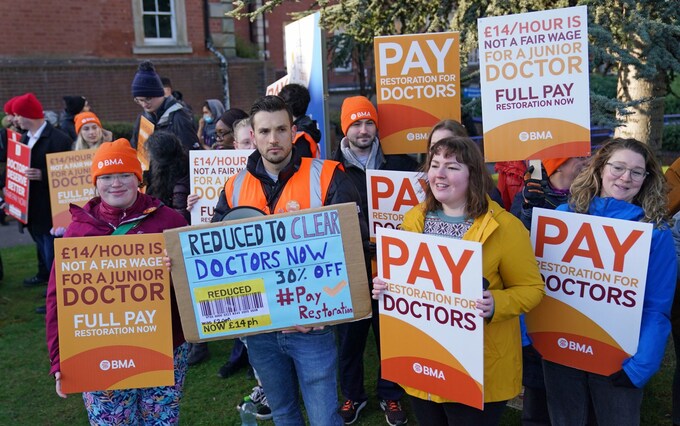The first day of the junior doctors’ extended strike in England has set off alarms throughout the nation as hospitals brace for potential disruptions to emergency care services during one of the busiest periods of the year. The British Medical Association (BMA), representing approximately 50,000 junior doctors, confirmed their members would be participating in a three-day strike starting Wednesday, followed by an even more extended six-day strike scheduled from January 3 to 9. The intensification of industrial action in their prolonged dispute with the government over pay has raised serious concerns among healthcare professionals and the public alike.
Cheltenham General Hospital took a proactive approach in response to the strike, announcing the temporary closure of its accident and emergency department. Hospital administrators cited the “very challenging environment” created by the strike as the primary reason for this decision. Simultaneously, hospitals in London issued a collective plea to the public, urging them to utilize A&E services strictly for “real emergencies” during the strike period.
The deadlock between junior doctors and the government arose after the doctors rejected an offer of a pay increase ranging between 8% and 10%. Insisting on a 35% improvement, junior doctors argue that such an adjustment is necessary to counteract the cumulative impact of inflation over the course of several years.
British Health Minister Victoria Atkins responded to the strike by emphasizing the implementation of significant contingency measures to mitigate disruptions to healthcare services. She further expressed the government’s willingness to resume negotiations with the BMA, highlighting the importance of finding a resolution that addresses the concerns of junior doctors while ensuring the stability of essential medical services.
The forthcoming six-day strike in January is poised to become the longest in the history of Britain’s National Health Service (NHS). Hospital administrators emphasized the challenges posed by consecutive walkouts over the Christmas break. Ananthakrishnan Raghuram, Chief Medical Officer of the group overseeing Cheltenham’s hospital, stated, “The latest round of strikes at the busiest time of the year will bring substantial challenges to the local NHS, particularly hospital services.”
The ongoing industrial action within the NHS has already resulted in the cancellation of 1.2 million operations and appointments this year. This disruption hampers Prime Minister Rishi Sunak’s efforts to reduce waiting lists, a key priority for his administration. While the government has successfully negotiated fresh pay deals with other healthcare workers, including nurses and senior doctors, the dispute with junior doctors remains unresolved.
Expressing regret over the breakdown of talks, Britain’s Work and Pensions Minister Mel Stride remarked on Times Radio on Wednesday, “I think it’s deeply regrettable that they’ve walked away from these talks.” The escalation of the strike adds further complexity to the ongoing challenges facing the healthcare system. As stakeholders grapple with finding a resolution that addresses the concerns of junior doctors while ensuring the continuity of essential medical services, the nation watches closely, cognizant of the broader implications for the stability of the NHS. The situation underscores the delicate balance between the legitimate demands of healthcare professionals and the government’s responsibility to maintain a robust and reliable healthcare system for all citizens.



